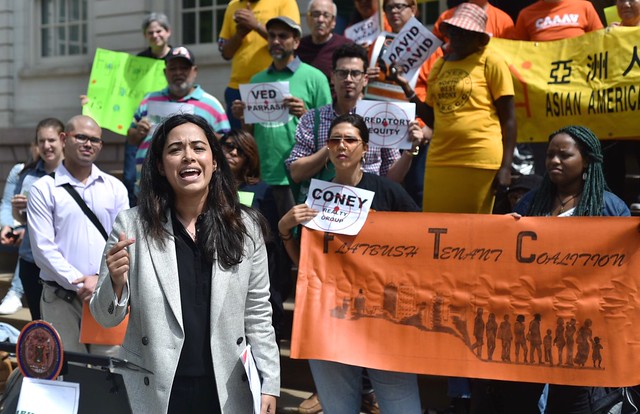
Council Member Rivera at a CLT rally (photo: John McCarten/City Council)
In the wake of the COVID-19 pandemic, New York faces two new fronts in its housing crisis -- a wave of heightened speculation likely to destabilize communities and an onslaught of expected evictions as housing courts reopen.
As Mayor de Blasio and the City Council approach the June 30 deadline for voting on the fiscal year 2021 budget, communities of color hardest hit by the COVID-19 pandemic are not seeing anywhere near the requisite level of support to combat these crises.
Although the city faces real fiscal challenges, we must reject austerity measures that would disproportionately harm Black and brown communities already reeling from coronavirus, job losses, and so many other glaring inequities. Instead, we must ensure a budget that prioritizes neighborhood equity and lays groundwork for a just recovery -- starting with support for community land trusts (CLTs).
Last year, the city provided groundbreaking funding to help launch a dozen CLTs in neighborhoods across the city -- a crucial step toward giving communities control over land and housing. The city should renew funding for the citywide CLT initiative to address the deepening housing crisis and continue to advance community-led development.
Rooted in civil rights struggles in the South, CLTs combine land ownership and management with community organizing. Community residents work together to collectively decide how to acquire and develop land, meet community needs and preserve affordability for future generations.
One of the most successful CLTs in the country is right here on the Lower East Side. For almost 30 years, the Cooper Square CLT has stewarded hundreds of units of permanently-affordable housing and dozens of commercial storefronts with below-market rents. The CLT and its affiliated Mutual Housing Association reach deep affordability through economies of scale, ensuring that rents remain affordable at levels that meet neighborhood needs.
Inspired by the success of Cooper Square and other CLTs across the country, a new generation of land trusts is emerging across the city -- from Tremont and Melrose to Jackson Heights, East New York, and beyond -- to take land and housing out of the speculative market, for good. Continued support is critical as CLTs move toward acquiring property for deeply and permanently affordable housing, retail and arts spaces, and other community needs.
But we also need to give CLTs, along with mutual and resident-controlled housing, the tools they need to succeed.
That’s why we’re also fighting for passage of two pieces of legislation -- the Community Opportunity to Purchase Act (COPA) in the City Council and the Tenant Opportunity to Purchase Act (TOPA) in the State Legislature.
COPA would immediately give CLTs, non-profit affordable housing developers, and other organizations a right of first refusal whenever landlords decide to sell apartment buildings or property, ensuring they have time to secure and develop the funds necessary to make competitive offers on available property. TOPA would give the same right of first refusal to individual tenant organizations to purchase their own properties.
The need -- and opportunity -- for CLTs and community ownership initiatives has never been greater. As land and housing prices tumble in the wake of COVID-19, CLTs will be critical to guard against ramped-up real estate speculation, which wreaked havoc in Black and brown communities after the 2008 financial crash. Foreclosures rarely occur on CLT-owned land, as just one example of their stabilizing impact. With land trusts forming across the five boroughs, the time to redouble our commitment to this model is now.
In his State of the City speech earlier this year, Mayor de Blasio announced his administration’s support for CLTs, including a commitment to add 3,000 units of housing on CLT land over two years. The mayor and the Council must deliver on this pledge.
The coronavirus has brutally exposed inequities in our city, and the insufficiency of current approaches to housing, health care, and so much more. A just recovery will require centering solutions developed by community residents to achieve true community safety and self-determination. New York City should make sure that CLTs and community-led development are part of the equation.
***
City Council Member Carlina Rivera represents parts of Manhattan. Deyanira Del Río is Co-Director of New Economy Project. On Twitter @CarlinaRivera & @deydelrio.
***
Have an op-ed idea or submission for Gotham Gazette? Email This email address is being protected from spambots. You need JavaScript enabled to view it.




